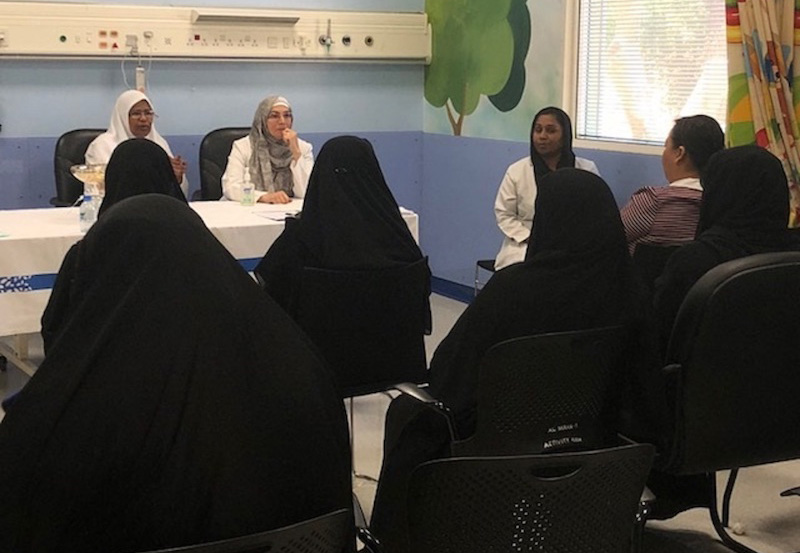A mother’s support group launched last March at the Rumailah Hospital of Hamad Medical Corporation (HMC), enables parents of children with long-term medical conditions to take a more active role in their child’s care.
The initiative has provided a platform for mothers of patients at the Al Maha Children’s Unit 1 to have direct access to their child’s care team and to receive support from other parents.

The Al Maha Children’s Unit at Rumailah Hospital, known as Al Maha I, was established in 2010 to provide specialised care for children who have complex, long-term health conditions. The unit cares for children aged three months to 14 years old. The length of stay for each child admitted to the unit varies from months to years, depending on their diagnosis. Many of the patients cared for at the 26-bed long-term care facility have their breathing supported by a mechanical ventilator.
The mother’s support group is the latest initiative to improve patient care and experience. In 2016, the staff at Al Maha I implemented a successful programme designed to help long-term ventilated children live at home. That programme has seen a number of children who had been hospitalised, in some cases for many years, safely transitioned back into the community and visiting home frequently.
Mariam Nooh Al Mutawa, Executive Director of Nursing at Rumailah Hospital, said the mother’s support group is unique to the Gulf region.
The support group was introduced as part of our commitment to promoting open communication between parents and our nursing and medical staff. As part of the programme, the mothers and other family members of new patients are given a comprehensive orientation. They are encouraged to ask questions, voice concerns, and provide suggestions.’
She said that one of the reasons the support group has been so well received is because of the support it provides families. She said it has become an important source of encouragement and knowledge.
Many of our patients’ families take very active roles in their child’s care. Caring for a child with complex care needs can be a very isolating and all-consuming experience and the support group has provided an important outlet by connecting the parents who may be dealing with many of the same challenges.’
Lilykutty Joseph, Head Nurse at Al Maha I, said that since the mother’s support group was initiated, it has been expanded and now includes a WhatsApp group that connects parents, nursing staff, and medical teams. She said it has become an effective way for care teams and parents to ask questions and share information about meetings, upcoming activities and events organised by the unit, such as celebrations for National Day, Mother’s Day, and birthdays.
Facing Similar Experiences and Challenges
One of the first members of the group was the mother of a four-year-old girl with spinal muscular atrophy, a genetic disease affecting the part of the nervous system that controls voluntary muscle movement. Her daughter, who was diagnosed with the conditon when she was only four months old, received treatment abroad before being transferred to Al Maha I.
She said the support group has been a blessing that has enabled her to take a more active role in the care of her child. She said the group has provided a lot of emotional support by connecting her with other families who face similar experiences and challenges.
Another support group member, the mother of a two-and-a-half-year-old boy with speech and movement disorders, said that navigating the healthcare system to access services for a child with long-term medical needs can be confusing. Her child requires long-term mechanical ventilation due to breathing difficulties and she said working with various service providers, such as Rumailah Hospital, the Ambulance Service, and Home Healthcare Service, can be overwhelming. She said she is grateful to the group, as there is always someone available to answer her questions and listen to her concerns. She said the group has helped her feel ’empowered’ and less isolated.
Dr Reem Babiker Abdalla Mohamed, General Paediatrics Consultant at Al Maha 1, said that parents are among the most important members of a child’s care team.
The mother’s support group was established to strengthen the relationship between our doctors and nurses, and the families of our patients. It has provided an important avenue to find solutions to challenges encountered by the healthcare team and the patients.’
Ongoing communication between parents and the multi-disciplinary team is essential, according to Dr Mohamed, but she said that this is especially true when caring for patients with complex health conditions, and even more so in cases where a patient is transiting from hospital-based care to homecare.
Dr Mohamed explained that in cases where patients are being weaned off from mechanical ventilators and transitioning to home-based care, multidisciplinary teams work closely with parents to ensure the transfer is safe and seamless. She said that when it is clinically appropriate, transitioning a child from the hospital to home can significantly enhance their quality of life, allowing them to participate more fully in family life and even attend school.
For updates and more information about the mothers’ support group at Rumailah Hospital, visit hamad.qa.





